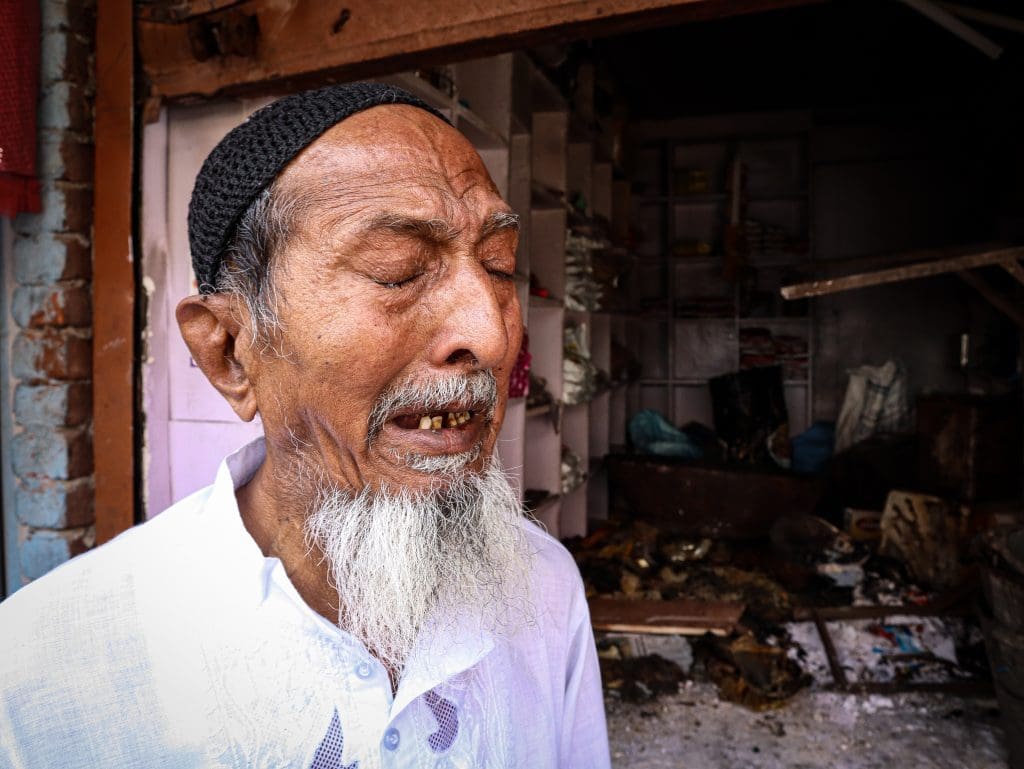
It was the first shop that I saw while entering the Boora-Batasha market at Karauli in Rajasthan. The overcrowded narrow lanes & the scorching sun were making it difficult to even stand outside the gutted shop. There I met Usman (name changed), a man in his late thirties sitting hopeless and looking at the burnt goods. While the Hindutva mob left nothing useful in his shop, the adjacent Hindu shop remained untouched.
I asked Usman how the outside rioters knew the religious identity of the shop owners even in these narrow lanes. He replied in a hushed tone that they were not outsiders. The attack was preplanned and had the support of local neighbour shopkeepers. He also showed the small saffron flags that were placed outside the Hindu shops a day before the violence started.
In that busy lane & across the road, a total of 4 shops, all belonging to Muslims were looted and burnt down to ashes. I was least surprised, as I had witnessed the same pattern during the anti-Muslim Delhi pogrom 2020. Muslim business establishments and houses were selectively targeted by the Hindutva mob during that time. All I sensed was a similar modus-operandi.
The Communal fire has always been selective. It torches down a Muslim’s establishment while the Hindu one remains untouched by its flares. The odds of it, touching the Hindu establishment in the Hindutva regime are slim to none. It was at this place where I met Rahimuddin who asked me to see his looted shop in the nearby lane.
As we moved to Chaudharypada, a marketplace with narrower lanes and more difficult to manoeuvre, Rahimuddin Kept telling me about the heritage of the area as to how Muslims had built the entire market complex some three centuries back and how the majority of them moved to Pakistan during partition.
Now the entire complex has only 2 Muslim shops. He was the first one I visited. A small shop, all looted & deserted.
When he started telling me how he got the clothes worth 8 lakhs on credit and with everything gone now, he had tears rolling down his cheeks. I went to his son Irfan’s shop. It was a big one at the end of the market complex.
The shop was so interior of the complex that only fellow neighbours could have identified it to be Muslim. The outside rioters would have never guessed that. Irfan had got readymade garments worth Rs 35 lakh in view of the upcoming Eid and now everything was turned to ashes. Irfan’s fervent cries still echo in my mind. I was aghast to see has how Hindu neighbours are hankering for Muslim blood under the Hindutva spell.
We later moved to PhootaKot area which mostly has bangle stores. There was a Temple nearby and all the newlyweds would purchase bangles from Muslim Shops because they were the biggest in the area. For the same reason, these shops were always seen with eyes full of hatred.
There I met Sitara & Khatoon Bano who are the sixth generation of bangle sellers in that area. They had a three-storied house cum shop that was looted and burnt. Later on, the police administration bulldozed the last remains of the heritage building showing safety concerns. I wondered where the safety concerns were gone when Hindutva rioters were putting it on fire. The shop opposite Sitara’s had a similar story. Everyone told me that it was the biggest bangle shop in the whole market. The only thing I could see was a plain plot with a few broken chunks of demolition waste. The whole building was bulldozed by the administration for a similar reason as Sitara’s.
It was the Zohar— afternoon prayer— time and I went to offer namaz at the mosque that was the epicentre of the violence. The mosque stood by the side of the narrow lane, it was the same lane where Hindutva rioters assembled at the Shobha Yatra and played provocative songs on the DJ. The lane looked deserted. When I enquired, I was told that the police are arresting anyone who is from the lane.
People have shifted to other locations.
We inspected a total of 18 properties that were vandalized & burnt down in the violence. All belonged to Muslims. There are a total of 113 individuals who were dependent on the shops, now burnt & bulldozed. The Total loss amounts to 1 crore & 43 Lakhs. I was told that the total Shops (including hand carts) that were looted and burnt were 52 out of which 47 belonged to Muslims.
The numbers have no relevance when what is at stake are democratic principles. In any democracy, minorities have three major concerns-security, equity (non-discrimination) & identity (religious, cultural, linguistic etc).
Be it the Karauli anti-Muslim violence 2022, Delhi pogrom 2020, Gujarat genocide 2002, anti-Sikh pogrom 1984.
The Indian democracy has the dubious distinction of subjecting its religious minorities to recurring genocidal attacks. For a country like India where religion is still the alpha and omega of Indian life, state-sponsored communal violence destroys whatever shards of democratic credibility of the state had left.
Imagine the trauma of a person whose only source of livelihood has been burnt and bulldozed unreasonably in front of his eyes. What were the crimes of those innocent people who have to go through this unimaginable pain, a lifetime dreadful nightmare — being a Muslim in this ‘diverse’ and ‘secular’ country?



